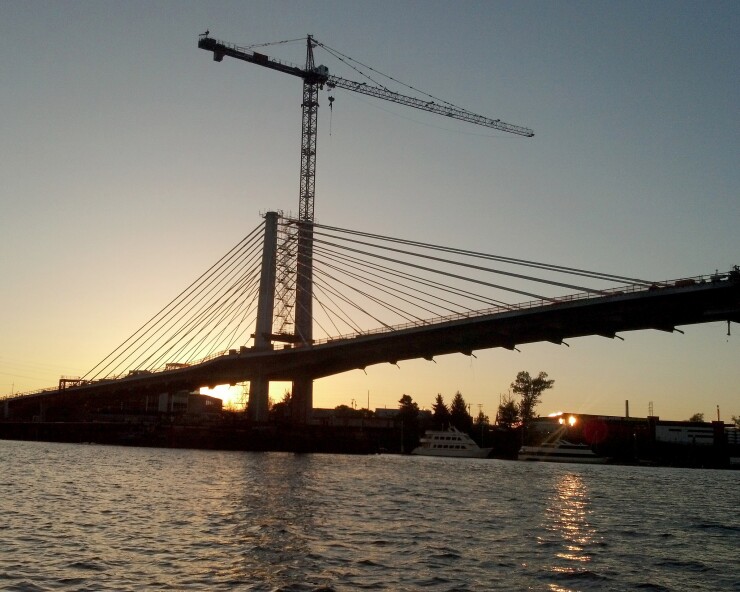WASHINGTON — A possible meeting between Democratic leaders and President Donald Trump in the coming weeks has done little to quell skepticism that an infrastructure bill could pass this year, or even in 2020.
House Speaker Nancy Pelosi, Senate Minority Leader Chuck Schumer and Trump are planning to meet in the next few weeks to talk infrastructure,
“It’s better that they’re meeting than if they’re not meeting,” said Ryan Abraham, a principal at Washington Council EY, who spent 14 years serving on the Senate Finance Committee. He added it was a good sign that they can have a conversation.

“But a lot more is going to have to happen, like having deeper conversations around offsets and size of the legislation,” Abraham said.
Conversations around pay-fors such as a gas tax could still cause disagreement, he said.
As a presidential election year approaches, congressional committees are trying to get out ahead of the curve and move a bill this year.
An infrastructure bill that includes reauthorizing the Fixing America’s Surface Transportation Act or FAST Act — set to expire in 2020 — could have a better chance than a larger infrastructure package, Abraham said.
“That effort on infrastructure has a much better chance of moving forward this year, and if not this year, then next year,” he said. “If we’re talking about a more comprehensive, trillion dollar package creating new policy — that will be much more difficult and would require larger pay-fors and offsets, which are always controversial.”
While “infrastructure” generally is thought to be a bipartisan effort, policy disagreements on how to actually fund it have made bill-writing difficult.
“Once you look beyond the veneer of general support for the concept, there’s a lot of policy detail disagreements,” said Michael Zezas, managing director and head of U.S. public policy and municipal credit strategy at Morgan Stanley.
Zezas said the meeting between Democratic leaders and Trump doesn’t change his view on whether a bill passes and he still believes it won’t pass this year.
“That they’re meeting doesn’t tell us that they’ve come any closer together on the finer points of the policy disagreements that they have,” Zezas said.
With a multibillion-dollar gap to fill,the FAST Act expiring in 2020 and the holes in funding for the ailing Highway Trust Fund, lawmakers are looking for ways to fund infrastructure for the long haul. Clearly a long-term infrastructure bill would be welcomed by the municipal industry because it would provide certainty about the federal government’s financial commitments to states and localities — and potentially create new infrastructure projects financed with tax-exempt bonds.
The primary source for funding transportation needs alone, the HTF, is a federal account fueled by federal gas and diesel fuel tax revenue, and a majority of its spending is in the form of grants to state and local governments. It’s well-known that the HTF has been bleeding money for years since the federal gas tax — at 18 cents per gallon — hasn’t been raised since 1993 and more fuel efficient and alternative fuel vehicles are requiring less fuel for the same miles traveled.
“My observation on the gas tax is that it’s one of those areas that sounds like there should be bipartisan approval and if there were to be bipartisan approval, then you could do a larger infrastructure package because that would be the financing mechanism to do that,” Zezas said.
WHAT’S POSSIBLE?
The muni market has sought for years to expand the allowable uses of private activity bonds, which Zezas said could have some hope in any potential legislation. He said more PABs would provide issuers more flexibility and potentially boost the number of deals coming to market.
Expanding PABs may have more hope since it was clear lawmakers saved it during tax reform, but it won’t pass unless it’s attached to a larger legislative vehicle, Zezas said.
Some market participants have also been hopeful on seeing the return of some kind of direct-pay bonds, such as the Build America Bond program, which reimbursed 35% of the interest issuers paid on the bonds. When BABs were set to expire, many in the industry advocated to keep them alive with a smaller subsidy, as had been proposed under almost every Obama Administration budget proposals. There also have been multiple proposals introduced over the years to bring them back, though none have gained traction.
Zezas noted that lawmakers eyeing the growing federal deficit will be hesitant in reinstating them, Zezas said. PABs aren’t much better for the federal government as they would be forgoing tax revenue, he added.
With that large and growing federal deficit, lawmakers have to weigh where to spend, and as has been the case for more than 30 years, municipal bond-related provisions, including the tax-exemption, have been ripe for the picking. For BABs, the Treasury Department has to cut checks to state and local governments, bringing a very visual cost associated with the bonds.
"There is pretty substantial resistance to expanding certain programs particularly on the Republican side of the aisle, so that’s another mark against BAB’s relative to PABs,” Zezas said.
However, Abraham said there is a “decent chance” that direct-pay bonds could be considered in an infrastructure bill if it’s included with reauthorizing the FAST act.
“Both Senate and House champions are in very important positions and will probably be leading the conversations on infrastructure that will insist that there are (direct-pay bonds) part of the conversation,” he said.
Abraham referenced the House Ways and Means Committee Chairman Richard Neal, D-Mass, who is a big supporter on direct-pay provisions. Sen. Ron Wyden, D-Ore., ranking member of the Senate Committee on Finance, has repeatedly showed support for direct pay and other financing options for a future infrastructure bill and should make sure that direct-pay bonds are on the table, Abraham said.
Sen. Chuck Grassley, R-Iowa, has opposed direct-pay bonds in the past, but if an infrastructure package included other policies Grassley supports, such as funding mechanisms like in the Highway Trust Fund which provides grants to his home state, a bill could be pushed through.
“It’s the art of compromise in legislation where if there’s other things in the package that Grassley supports then Grassley wouldn’t sink an entire bill over the inclusion of a direct-pay bond,” Abraham said.
In the Morgan Stanley report released this week, it argued that investors should have low expectations from Congress.
Advance refundings have bipartisan support, but analysts wrote that its fate is tied to a broader infrastructure bill.
If it doesn’t pass this year, Zezas said the bill’s success will depend on if administration plans to prioritize other issues, like it did in 2017 with tax and healthcare reform.
“In the long term, infrastructure is one of those issues where there’s a gravitational pull toward the federal government spending more money on this issue. It just perhaps has not gotten to be a critical enough problem to force the issue,” Zezas said.
ISSUERS ARE SEEKING SOLUTIONS
For Councilwoman Kate Kruller in Tukwila, Washington, federal funding couldn’t come soon enough. The suburban city of about 20,000 borders Seattle, and Kruller said Tukwila has to compete for state funding with the large city.
Currently, Tukwila needs funding for a $40 million connector across a valley that is less than the size of a football field. She said the city has applied for TIGER grants, now called Better Utilizing Investments to Leverage Development (BUILD) grants, in the past. It received $5 million for planning and construction.
She is hopeful that an infrastructure bill will pass through the House, but said she is unsure on what will happen to it in the Senate.
Kruller says she thinks her representatives are listening, but the issue is just that lawmakers need to “play better in the sandbox.”
PRIVATE DOLLARS
William Rhodes, a partner at Ballard Spahr, doesn’t think Democrats and Republicans will find common ground for a meaningful infrastructure bill.

Rhodes said he was an optimist by nature so remains “somewhat hopeful” that because of a pressing need for infrastructure, some form of legislation could pass.
Political leaders are reluctant to embrace private investment in infrastructure as another possible financing source, he said. Liberalizing public-private partnerships across states isn’t being championed enough by lawmakers. Currently, 26 states have some kind of limitations on P3s.
“It seemed like one of those rare areas where you could find bipartisan support,” Rhodes said. “But the numbers that people were beginning to put around were so woefully inadequate to address that (infrastructure) problem, that I’ve become more pessimistic that any meaningful investment in infrastructure is on the table.”





